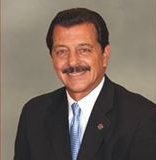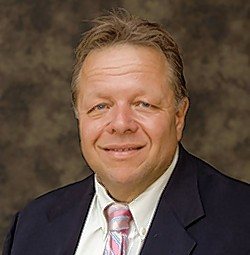In Wheeling, incumbent Mayor Dean Argiris is being challenged in his bid for a second term by former trustee Pat Horcher and park board Commissioner Michael Kurgan.
Here are excerpts from candidate questionnaires Argiris and Horcher completed. Kurgan failed to return a questionnaire. Full questionnaires are posted at dailyherald.com.
Q. What makes you the best candidate for the job?
Argiris: My work ethic. I work hard every day in my capacity as Village President to stay connected with the residents and businesses of our community as well as those that want to join our community. I have exhibited a willingness to work with other agencies within and outside of our village to bring opportunities that directly benefit the community we serve.
Communication is a big part of who I am. I truly believe the current board is the best I’ve seen in decades where a “team mentality” guides our actions every day. An example of that team philosophy is that I have encouraged this board to respect the professionalism of our staff and ask questions to help them make a good decision. This has helped get many projects off the ground during the four years that I have served.
Also, constant communication with our residents and businesses is important to me. There is no “voice mail” with Dean Argiris. All calls are forwarded to my cellphone so I can address their needs immediately.
My experience would also be a reason for my candidacy. I have served Wheeling in some capacity “appointed or elected” for 20 years. Watching the progress of Wheeling and being an integral part of it just makes me want to do more. Because of all the positive, people and businesses want to come to Wheeling
Horcher: I understand the limits of the offices scope of authority.
I will listen to people with opposing views because I know I don’t have all the answers and so I could be wrong.
I am self employed so my schedule is flexible.
My position on Cook County Farm Bureau puts me in contact with higher-placed elected officials; Wheeling could benefit from contact with them.
Wheeling’s social reputation and fiscal well-being directly impact mine.
When Wheeling prospers we all win
Q. How would you describe the condition of your community’s budget, and what are the most important specific actions the town should take to assure providing the level of services that people want?
Argiris: I am very proud that the last two years have produced balanced budgets in the Village of Wheeling. The last three years have produced
surpluses.
I instituted a policy with our staff that in any given year where a surplus exists and our other fund balances are strong, a percentage of the surplus be contributed toward our police, fire and IMRF pension fund obligations. Doing this helps us satisfy the state mandate that these pension funds be 90% funded by the year 2040. As a result of these positive budget practices, we were awarded an upgraded bond rating of AA+ last year. This, among other strong accounting practices, has only strengthened the village’s financial footing.
We need to continue the platform of strong economic development (i.e., residential, commercial, and industrial) which brings new tax revenues to our village. Continuing this trend helps our tax base by 1) keeping their tax rate consistent and 2) keeps our core service levels where our residents and businesses expect them to be.
In the last four years, we have reviewed and evaluated our bond debt to see if there was opportunity to refinance those debts. The end result was millions of dollars in taxpayer savings over the remaining term of those bonds.
Horcher: Condition — “Balanced.”
But to do so there is a practice of not adequately funding things like C.E.R.F. while supporting individual annual staff salaries equal to Wheeling residents median estimated household income.
I understand the staff of the village is our greatest asset/resource but it is also one of our biggest expenses.
What the village of Wheeling needs is village employees willing to work for what village residents earn.
Q: Where, if anywhere, could the current budget be trimmed, and conversely, are there areas the budget does not give enough money to?
Argiris: I witnessed a drastic cut in village personnel (~40 employees) in 2008. This action was difficult yet necessary to stabilize our budget due to the downturn in the national economy.
At the same time, we had to be sure that core services would still be adequately provided to our residents and businesses. Since then, increases in staffing, which comprises approximately over 70 percent of village expenses, has been carefully considered. Ultimately, our staffing levels of 2008 have become the “new normal” and we have been operating efficiently.
When considering the new residential, commercial and industrial development occurring in Wheeling right now, responsibly increasing staff will be a priority discussion I will have with village manager and the board.
The budget crisis happening in Springfield, has (and should have) all municipalities concerned. I have utilized my involvement with the Northwest Municipal Conference to keep protection of our LGDF share ($3.8 million to the Village of Wheeling) as well as opposing proposals for statewide property tax freezes top of mind.
Either of these proposals would have a detrimental impact on our municipality.
Also unfunded mandates imposed by the state is another strain on our budget that we always reach out to our legislators about. Other concerns I have is with the Cook County Board trying to mandate programs that directly affect our businesses in town. Regarding not having enough monies, it would be for personnel — economic development has really taken off these last four years.
Horcher: I have issues with the salary structure of our department heads and the justification.
According to sources like “www.census.gov” for 2011-15, Wheeling’s estimated median Household income $56,110; estimated Per Capita income $28,031.
Meanwhile Wheeling has “executive assistants” earning around that household median.
The salaries of the public servants (elected and salaried) need to be more commensurate with the public they serve. Pensions are being addressed for the future but there are expenses like “longevity “ that are questionable.
More money could go to an infrastructure improvement fund for Wheeling businesses.
There is a facade improvement fund to help make a business look nice even if it is trashed inside. It’s a grant to make sure everything looks good.
If a business wants the money to improve productivity or actual structural problems, the answer is no.
That money is for facades how things look is more important than how they run.
That should be turned around.
Q. Describe your leadership style and explain how you think that will be effective in producing effective actions and decisions with your village board or city council.
Argiris: As stated earlier, my style is team oriented. The decisions of village leadership are not made by one person. They are made by all of my colleagues on the board as well as the management team that works for the village. In an effort to have the elected officials more involved with the village departments, I instituted a liaison program. I assigned each trustee to a department to gain greater knowledge of how that department works. I made sure to rotate these assignments on an annual basis. It has worked very well — especially during budget season.
I reach out to fellow board members (on an individual basis) and ask if they have any questions or concerns regarding the agendas for our meetings. Conversely, the board knows I am always available to talk.
We have been successful creating other funding sources. We secured a successful lease agreement with SWANCC at our Public Works building as well as providing Police 911 dispatch services to the City of Des Plaines. Enacted a stormwater utility fee in 2016 for future projects and infrastructure improvements to combat our villagewide flooding issues.
Horcher: I understand the position is that of lead public servant and as such I must be answerable to any resident for anything I do as president.
Keep everyone involved and don’t get in the way.
When I was a trustee, if a resident needed help from a department I got them to those that could help and got out of the way
I would encourage discussion and intelligent argument.
I have always relied on facts to support my positions; if my information is faulty I reconsider my opinion.
Everyone must feel comfortable expressing their position, and should understand that intelligent people will at times disagree
Q. What is one good idea you have to better the community that no one is talking about yet?
Argiris: I would like to thoroughly explore expansion of the North Central Metra train service. Having this service increased from weekdays only to evenings, weekends and holiday service will not only supplement the success of the existing developments in Wheeling (i.e., Town Center and Northgate Crossings) but it will serve countless other communities along that route.
It will also attract more visitors from neighboring communities and the city of Chicago to our Town Center (expected completion 2018). We are currently doing a villagewide flood mitigation study to be completed in 2017.
Our ultimate goal is to reduce the number properties located in the flood plain and thus negating the requirement for the property owners to carry flood insurance.
Horcher: Take notice of Wheeling’s effect on ALL the other taxing bodies.
Hoarding property by buying it takes that property tax away from schools, parks, libraries, etc.
Scrouging away property taxes through TIF (tax-increment financing) is only slightly better.
Commercial and industrial properties can pay around 20% tax, hold a property 5-6 years and ALL taxing bodies loose the total equalized assessed value.






